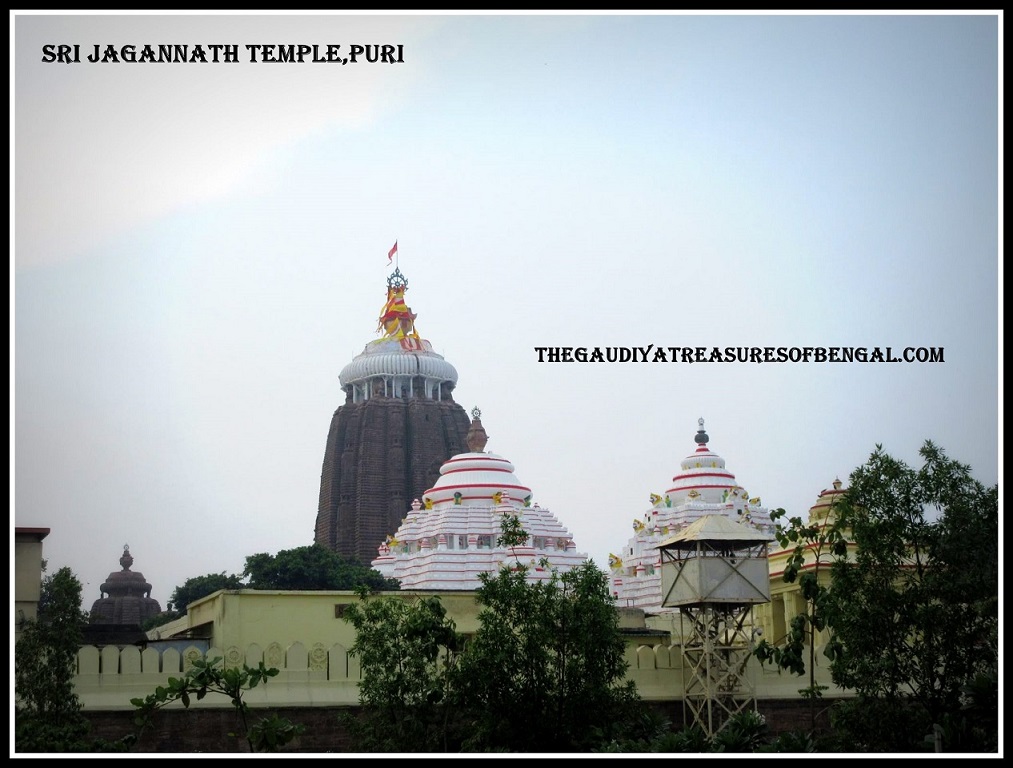
Jagannath Puri is located about 60kms from Bhubaneswar, on the coast of the Bay Of Bengal, in the state of Orissa, India. Jagannath Puri is addressed by various names. Some of these names are Sri Kshetra, Purushottama kshetra, Nilachala dham, Jagannath dham, Samanik tirtha, Uddiyan pith, Marta-Vaikuntha, Nilgiri, Niladri, Sankha kshetra, Bhu-svarga, and Nrsimha kshetra. Jagannath Puri is one of the most prominent spiritual sites of India (Bharat). It is said that the Supreme Lord bathes at Badrinath (situated in North India), He changes His clothes at Dwarka (situated in West India), accepts His food at Jagannath Puri (situated in East India), and then proceeds to take rest at Rameshwaram (situated in South India). Here at Jagannath Puri, the Supreme Lord resides in His deity form. Anyone who takes His darsana attains liberation from this material world. By visiting Jagannath Puri, one attains the pious credit of visiting all the other places of pilgrimage. Listed below are some of the exalted places of Jagannath Puri dham.
#1 Lord Jagannath temple, Puri
The word “Jagannath” stands for “Lord of the Universe”. King Indradyumna had established this temple of Lord Jagannath here on the Nilachal hill. We have narrated the relevant pastimes concerning the history of the Jagannath temple Puri in our previous articles. The present temple was built in the 12th century atop its ruins by the progenitor of the Eastern Ganga dynasty, King Anantavarman Chodaganga Deva. It is one of the most popular spiritual destinations in India. The structure of Jagannath Temple, Puri is an architectural and cultural wonder. It is about 65 meters in height and is built upon elevated ground, which makes it look imposing. The temple complex comprises an area of approximately 10.7 acres and is enclosed by 2 rectangular walls. The outer enclosure is called ‘Meghanada Prachira’ measuring approximately 200m (665 ft) by 192m (640 ft). The inner wall is called ‘Kurma bheda’, measuring 126m (420 ft) by 95m (315 ft) approximately.
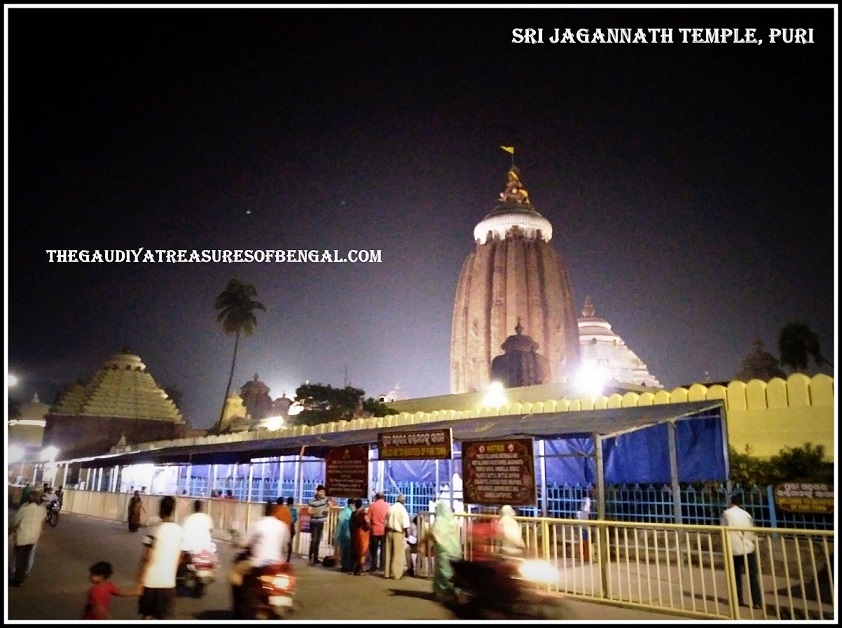
These walls were built during the 15th or 16th centuries. Thirty different smaller temples surround the main temple. The Lord Narasimha temple adjacent to the western side of the Mukti-Mandapa was built before the present temple. In front of the main gate (Simha Dwara) is an 11 m pillar known as Aruna Sthambha. This pillar was once in front of the Sun Temple in Konark. It was bought to puri during the 18th Century. The figure on the pillar is Aruna, the charioteer of the Sun God. The main deities of the temple namely Lord Jagannath, Lord Baladeva, and Subhadra Devi reside on the main shikhara or tower that rises above the inner sanctum. Above the ante-halls, some supplementary towers can be seen. The wall surrounding the temple complex has a gopura or gate over which rises a pyramid-shaped roof. Some of the other temples within the compound house deities of Sri Chaitanya Mahaprabhu, Lord Rama Chandra, Sakshi Gopal, Hanuman, Lord Narasimha, Lord Varaha, Lakshmi devi, and others. Vimala devi, a form of Goddess Durga, is also worshiped in one of the smaller temples within the compound.
How to Reach :
Jagannath Temple, Puri is situated on the Grand Road of the city of Puri. It is renowned all over the world. After arriving at the city of Puri, one can avail cabs to reach here directly.
#2 Gambhira (Sri Radha Kanta Math)
Gambhira is the house of Kasi Misra where Lord Chaitanya resided for the last twelve years of His manifested pastime. Gambhira is situated at Balisahi, to the southeast of Jagannath temple in Puri. The place has also come to be referred to as the ‘Radha Kanta Math’ because ‘Radha Kanta’, a beautiful deity of Sri Krishna, is also worshiped at this place. After accepting His sannyasa, Lord Chaitanya shifted from Bengal to Jagannath Puri. He initially stayed at the residence of Sarvabhauma Bhattacharya. But later, after He returned from His tour of South India, He accepted the Gambhira, the house of Kasi Misra, as His residence.
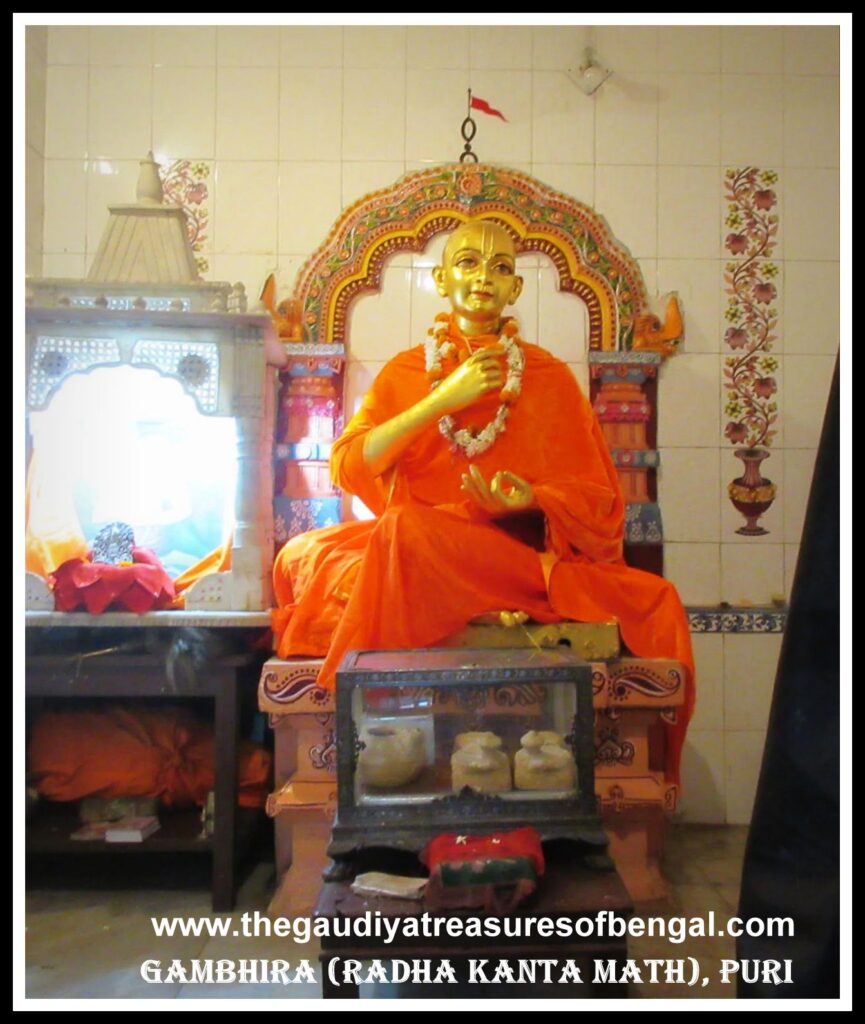
During the later stages of His pastime at Gambhira, Lord Chaitanya was so greatly obsessed with the feeling of separation from Krishna, that He exhibited the highest symptoms of devotional ecstasy. His condition was similar to the Gopis of Vrindavan who were devastated after Krishna left for Mathura. The lamentation of Srimati Radharani that was witnessed by Uddhava when he visited Vrindavan after Krishna had left, became a feature of Sri Chaitanya Mahaprabhu’s transcendental madness. When the Gopis felt separation from Krishna, they underwent ten kinds of bodily transformations. The same manifestations appeared in the body of Sri Chaitanya Mahaprabhu. Whenever Mahaprabhu manifested such ecstatic emotions, Ramananda Raya and Svarupa Damodara recited various verses from the scriptures or the works of Chandidasa, Bilvamangala Thakura, Jayadeva Goswami to pacify the impassioned heart of Lord Chaitanya. Visiting Gambhira, one can take darsana of Sri Chaitanya Mahaprabhu’s room, His Kamandulu, footwear and quilt. One can also attain darshan of the enchanting deities of Sri Radhakanta (Krishna), Srimati Radharani, and Lalita devi.
How to Reach :
Gambhira or Radhakanta Math, as it is also known, is hardly a 10 minutes walk from Swargadwar in Puri. The Math is also quite near to the Puri Jagannath temple. It is situated at Balisahi, to the south east of Jagannath temple in Puri. The place is quite renowned and one can avail cabs to reach here directly.
#3 Tota Gopinath temple
After Lord Chaitanya had taken His Sannyasa, He shifted from Bengal to Jagannatha Puri. Sri Gadadhara accompanied the Lord to Puri as well and engaged Himself in the service of Tota Gopinatha. Sri Tota Gopinatha is an exquisitely beautiful Deity of Lord Krishna. Tota Gopinatha is also the most unique as He is the only deity of Krishna who manifests the posture of sitting down. This enchanting deity of Tota Gopinatha jiu was unearthed by Sri Chaitanya Mahaprabhu when He started digging the ground one day, feeling intense separation from Krishna, the Supreme Lord. Crying out “Where is my Prananath? ” Lord Gauranga started digging the ground in divine ecstasy and in the process discovered this enchanting deity.
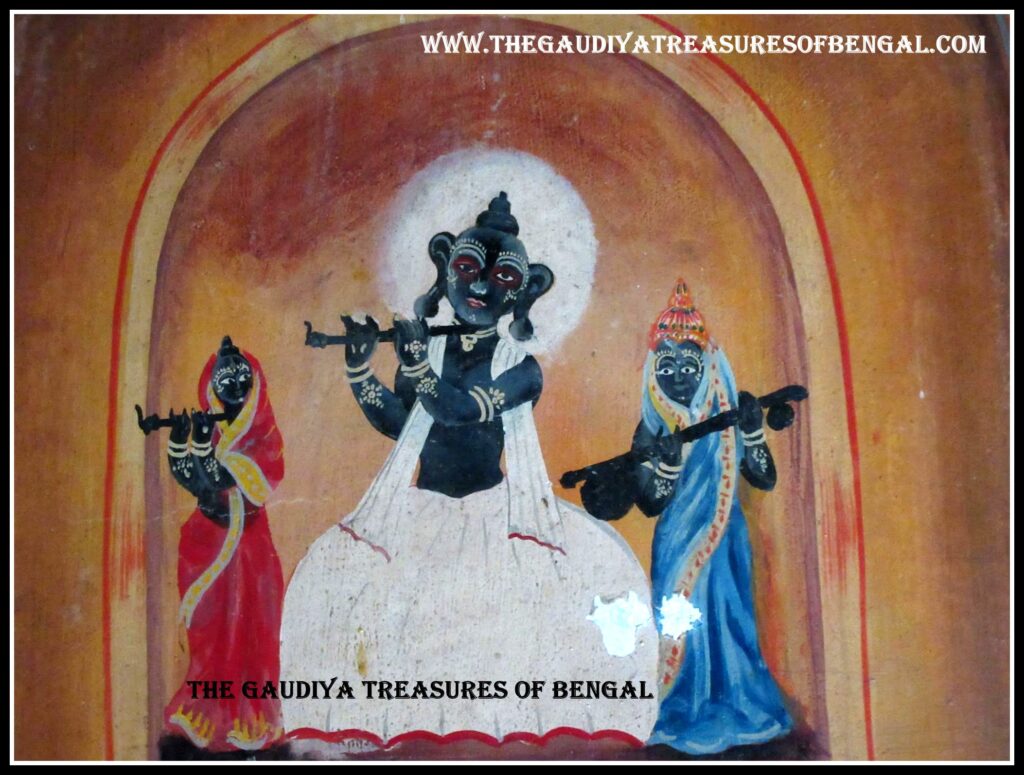
Sri Gadadhara had dedicated Himself unto the service of this deity ever since. Mahaprabhu named the Deity Gopinath, and because the deity appeared in a garden (garden is called ‘tota’ in Oriya) the devotees refer to Him as Tota Gopinath. Sri Vrindavana das Thakura mentions in Chaitanya Bhagavata, that the heart of even the most demoniac atheist would soften upon taking darsana of this mesmerizing deity of Tota Gopinatha. Every day, at the temple of Tota Gopinatha, Sri Gadadhara Pandita would recite Srimad Bhagavatam and Lord Chaitanya, along with His associates, would often visit to relish the nectar.
How to Reach :
Gopinatha temple is situated in Sri Ksetra Jagannatha Puri Dhama in an area named Yamesvara Tota. The temple of Tota Gopinath is located by a large water tower. The temple is hardly a five minutes walk from the Chataka Parvat Purushottam Gaudiya Math temple. The place is renowned as the ‘Tota Gopinath temple’ and one can avail cabs to reach here directly.
#4 Gangamata Math – Sarvabhauma Bhattacharya’s House
Gangamata Math is situated to the south of the Jagannath temple on the bank of the Sweta Ganga tank in Jagannath Puri. This was previously the residence of Sarvabhauma Bhattacharya. It was here at Gangamata Math that Sri Chaitanya had explained the ‘atmarama’ verse of Srimad-Bhagavatam to Sarvabhauma in eighteen different ways. Sarvabhauma could gradually perceive that Lord Chaitanya was none other than the Supreme Lord. When the Bhattacharya came to his senses, Sri Chaitanya Mahaprabhu disclosed to him His real identity revealing to him His sad-bhuja form (six handed form). The Bhattacharya then recited one hundred verses glorifying Lord Chaitanya Mahaprabhu and offered his obeisances.

Later Saci devi, princess of Puthia, had taken up Gangamata Math as her residence on the instructions of Sri Haridasa Pandita, her spiritual master. Saci devi came to be later known as Ganga Mata, owing to miraculous pastimes at Sweta Ganga.
How to Reach :
Gangamata Math is situated to the south of the Jagannath temple on the bank of the Sweta Ganga tank in Jagannath Puri. It is hardly a 10 minutes walk from the Jagannath Puri temple. The place is quite renowned and one can avail cabs to reach here directly.
#5 Siddha Bakul
After Chaitanya Mahaprabhu had accepted His sannyasa, and shifted to Jagannatha Puri, Srila Haridas Thakur followed Him as well. Despite being a stalwart Vaishnava, Srila Haridas had always considered himself to be low-born and exceedingly abominable. Hence, out of his sheer humility, he never entered the premises of the Jagannatha Puri temple. At Puri, Lord Chaitanya had arranged a place for Haridas’s stay, positioned just behind His own residence at Gambhira. The residence of Srila Haridas is renowned today as ‘Siddha Bakul’ (Siddha means perfect).
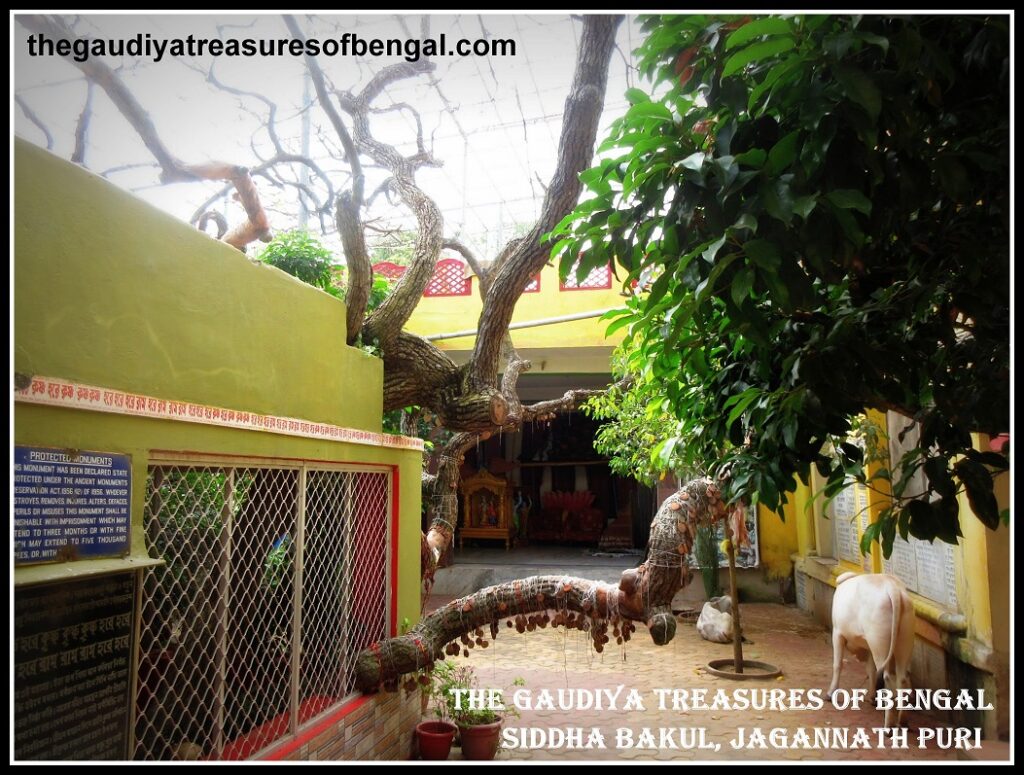
The sacred place has derived its name from a Bakul tree that grows over here. This fortunate tree is over 500 years old and it used to provide its cooling shade under which the Thakur chanted his rounds peacefully. Lord Chaitanya had personally planted a used tooth-stick of Lord Jagannatha into the ground at this place, which immediately grew up and blossomed into this Siddha Bakul tree. To this day, anyone visiting this place can take darsana of this sacred Bakul tree. The tree looks like it has exploded or it appears to be completely dead. Yet it is wonderfully thriving with lush green leaves and fragrant flowers.
How to Reach :
Srila Haridas Thakura’s bhajan Kutir (Siddha Bakul) is located on the Bali sahi Road. It is not very far from Gambhira, the erstwhile residence of Lord Chaitanya in Puri. Siddha Bakul is about a Kilometer from the Jagannath temple and about 3 Kms from the Jagannath Puri Railway station.
#6 Haridas Thakur Samadhi, Swargadwar
About 500 years ago, namacharya Srila Haridas Thakur breathed his last and wrapped up his earthly pastimes at Siddha Bakul in Jagannath Puri. He yearned to pass away while beholding the moonlike face of Lord Gauranga. Lord Gauranga, the Supreme Lord, granted the wish of Haridas, His beloved servant. Holding the lotus feet of Lord Chaitanya upon his heart and drinking the nectar of the Lord’s moon-like face, Haridas incessantly chanted the holy name of Sri Krishna Chaitanya in ecstasy. While chanting thus, he left his body, entering the eternal abode of the Supreme Lord.
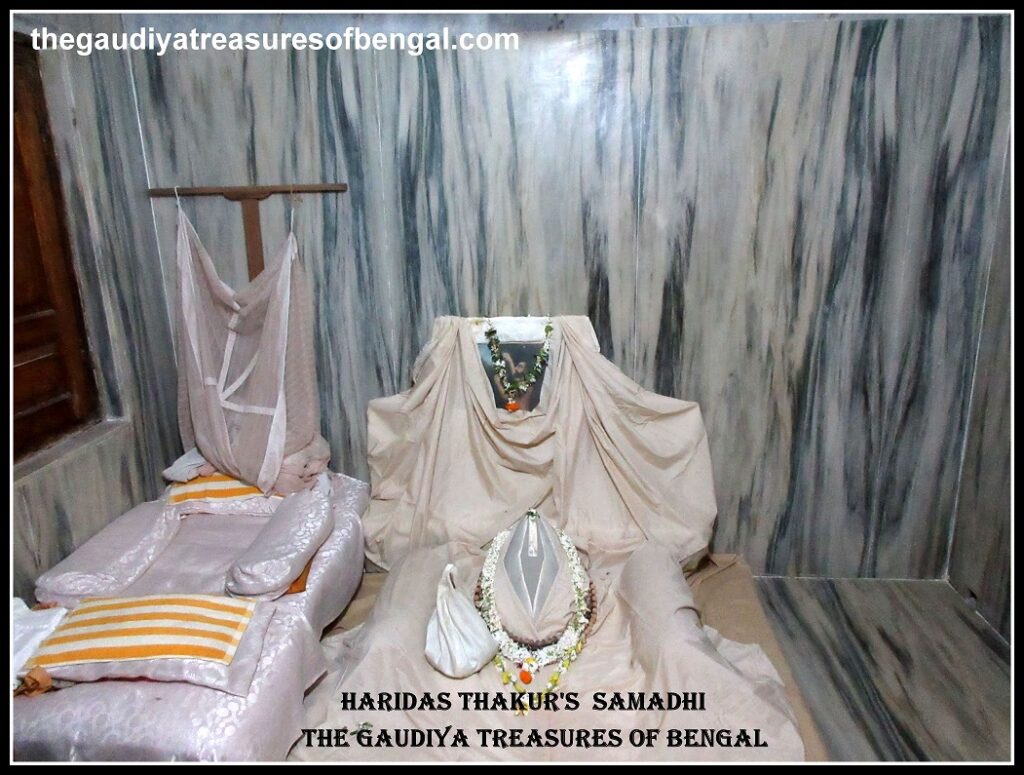
Raising the body of Haridas Thakur with His own hands, Lord Chaitanya began dancing in divine ecstasy. There was a tumultuous roar and all the devotees joined in the Harinama sankirtana. Chanting and dancing, Lord Chaitanya led a procession carrying the body of Haridas to the sea. Mahaprabhu bathed the body of Haridas Thakura and then proclaimed that the sea had become a great site of pilgrimage from then on as it touched the transcendental body of Haridas.
haridase samudra jale snana karaila
prabhu kahe – “samudra ei ‘maha-tirtha’ haila”
(Chaitanya Charitamrta, Antya, 11.64)
All the assembled devotees drank the seawater and touched the lotus feet of Srila Haridas Thakura. Thereafter, a hole was dug in the sand and the transcendental body of Haridas Thakur was placed into it. Amidst loud sankirtana, silken ropes, sandalwood pulp, food, and cloth were placed upon the body. Lord Chaitanya personally covered the body of Haridas with sand. The devotees assisted the Lord and constructed a raised platform on the site. The platform was then enclosed by a fence to give protection. This samadhi of Haridas Thakur is a prominent place for pilgrimage for devotees all over the world even to this day. A temple has since been constructed on the site which houses and protects the samadhi.
How to Reach :
Srila Haridas Thakura’s Samadhi is located on Haridas Math Lane, situated on the oceanfront in the area of Swargadwar opposite to ISKCON temple (Bhakti Kuti). 500 years ago, during the time of Chaitanya Mahaprabhu the place was just a sandy beach. There is a nice temple that is now constructed that houses and protects the samadhi. ‘Haridas Thakur Samadhi temple’ is located about 2 Kms from Jagannath Puri temple, 3 Kms from Puri bus stand and 3.5 Kms from Puri Railway Station.
#7 Jagannath Vallabh garden
Jagannath Vallabh Garden, situated on the south of Narendra Sarovara, is considered to be as ancient as the temple of Lord Jagannath. This large garden, full of coconut trees and a cooling pond, is very dear (vallabha) to Lord Jagannath because it grows a variety of flowers and fruits that are engaged in His service. Lord Jagannath’s ‘utsava murti’ (festival Deity) is also brought here on numerous auspicious occasions for Him to relish the various festivities that are conducted here. On the left entrance is situated Jagannath Vallabh Math, which is believed to have been established by the devotees of Sri Vishnuswami sampradaya. This garden is very significant for the Gaudiya Vaishnavas as Sri Chaitanya Mahaprabhu had enacted many of His wonderful pastimes here at this place. Visiting this garden one full moon night in the month of Vaisakha (April-May), Lord Chaitanya made His associates sing the verse from Gita Govinda beginning with the words – ‘Lalita Lavanga Lata’ as He danced about in the garden.
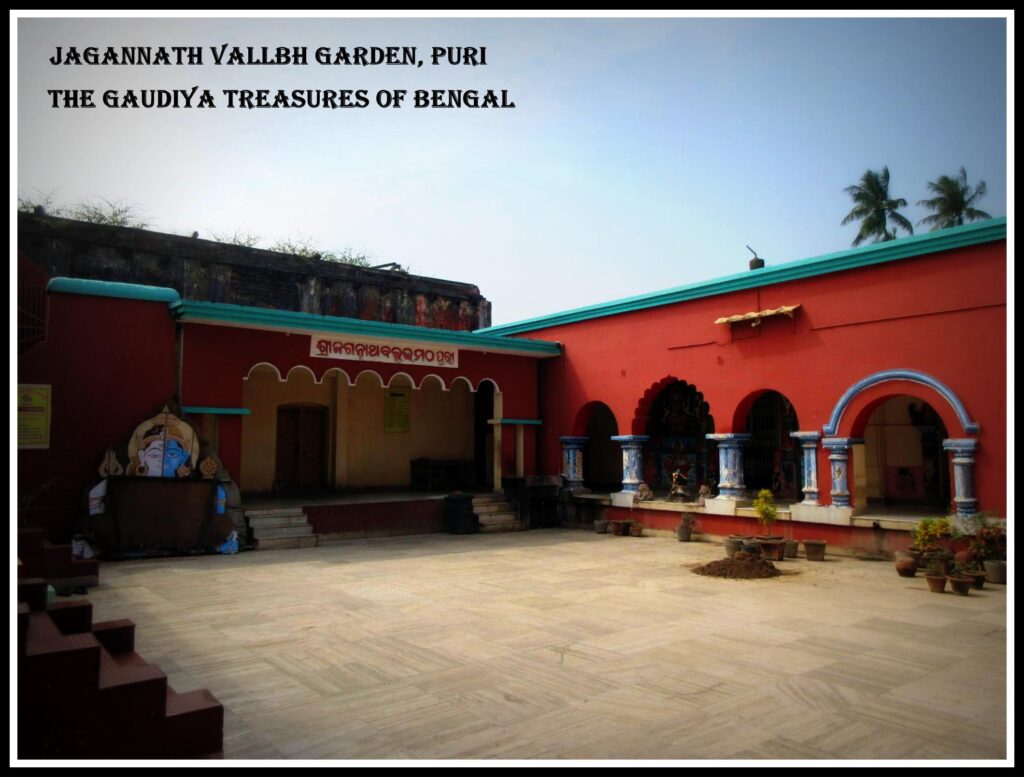
While wandering thus, Sri Chaitanya suddenly saw Krishna underneath an Ashoka tree. As soon as Lord Chaitanya ran towards Him, Krishna smiled and disappeared from His sight. Having found and then lost Krishna, Lord Chaitanya became disheartened and fell unconscious. The whole place was filled with Krishna’s fragrance which further maddened Lord Chaitanya who craved to relish it. On the occasion of the Ratha yatra, it was here at the Jagannath Vallabh Garden that Lord Chaitanya had rested after dancing ecstatically. It was here at Jagannath Vallabh Garden that Lord Chaitanya bestowed His causeless mercy upon King Pratap Rudra who had forsaken his royal robes and approached the Lord dressed as a Vaishnava. It was here at the Jagannath Vallabh garden that the King messaged the legs of Lord Chaitanya and recited verses from Srimad Bhagavatam.
How to Reach :
This place is a few hundred meters walk up the Grand Road towards the Jagannath temple. The Garden has a distinctive dark red boundary wall. It is situated on the opposite side of the well-known landmark of Municipal Market.
#8 Gundicha temple
Gundicha temple is situated at the end of Badadanda or Grand Road, to the northeast of the main Jagannath temple. It is at a distance of around two kilometers from the Jagannath temple. Within the Gundicha Temple, there is a ‘Mahavedi’ where the deities of Jagannath, Baladeva, and Subhadra had appeared in Satya Yuga during the time of King Indradyumna. The Gundicha temple is identified as the birthplace of Lord Jagannath and is named after King Indradyumna’s wife, Gundicha Maharani. It was in this area that King Indradyumna had performed a thousand Ashwamedha Yajnas. Lord Jagannatha, Baladeva, and Subhadra along with Sudarshan, leave Jagannatha Mandira for nine days. They travel to the Gundicha on the Ratha Yatra day, reside there for seven days, and then on the ninth day, they return to the main temple.
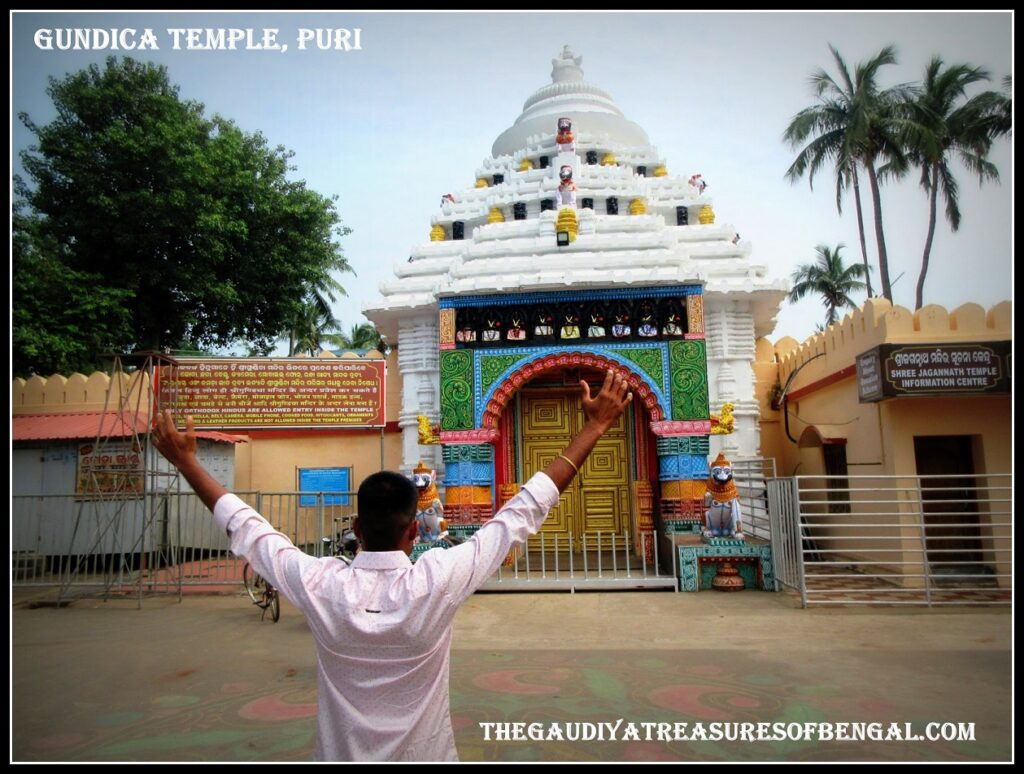
This Journey is also known as Gundicha Yatra, Nava Dina Yatra (nine days Journey), or Ghosa Yatra. It is very auspicious to attain the darshan of Jagannatha during this time. Darshan of Jagannatha during His stay at Gundicha temple is known as ‘Adapa Darshan’. It is mentioned in the scriptures that the darshan of Lord Jagannatha at Gundicha is ten times more spiritually beneficial than taking His darshan at the main Nilachala temple (main temple).
The place where the Gundicha temple is situated is also known as Sundarachala. It is compared to Vrindavan. Gundicha is surrounded by lush gardens and tall coconut trees. Fragrant flowers and shady trees create a Vrindavan-like atmosphere which Lord Jagannath enjoys for 7 days before returning to Jagannath Mandira during Bahuda Yatra (Ulta Rath).
Gundicha is a typical Kalinga temple and has four main components – Vimana (tower housing sanctum), Jagamohana (assembly hall), Nata Mandapa (festive hall), and bhoga Mandapa (Prasadam offering hall). The Kitchen is attached to the main temple via a small passage. The Gundicha temple has no activity throughout the year except for the nine days when the Ratha Yatra takes place and Lord Jagannath resides here.
How to Reach :
Gundicha is situated at a distance of just 3 kilometers from the main Jagannath temple in Puri. It is located at the end of Badadanda or Grand Road. The place is quite renowned and one can avail cabs to reach here directly.
#9 Lord Narasimha deva temple
This temple of Yajna Narasimha is one of the most ancient Vaishnava Shrines in Jagannath Puri. Situated near the northeast boundary wall of the famous Gundicha Temple, the Narasimha shrine finds its mention in the Skanda Purana and is said to have existed at the time King Indradyumna visited the place in Satya Yuga. King Indradyumna is said to have built a temple for Narasimha and installed the deity therein, with the help of Sage Narada. Indradyumna also performed thousands of Ashwamedha yajnas in this temple, and thus the Deity is known as Yajna Narasimha.
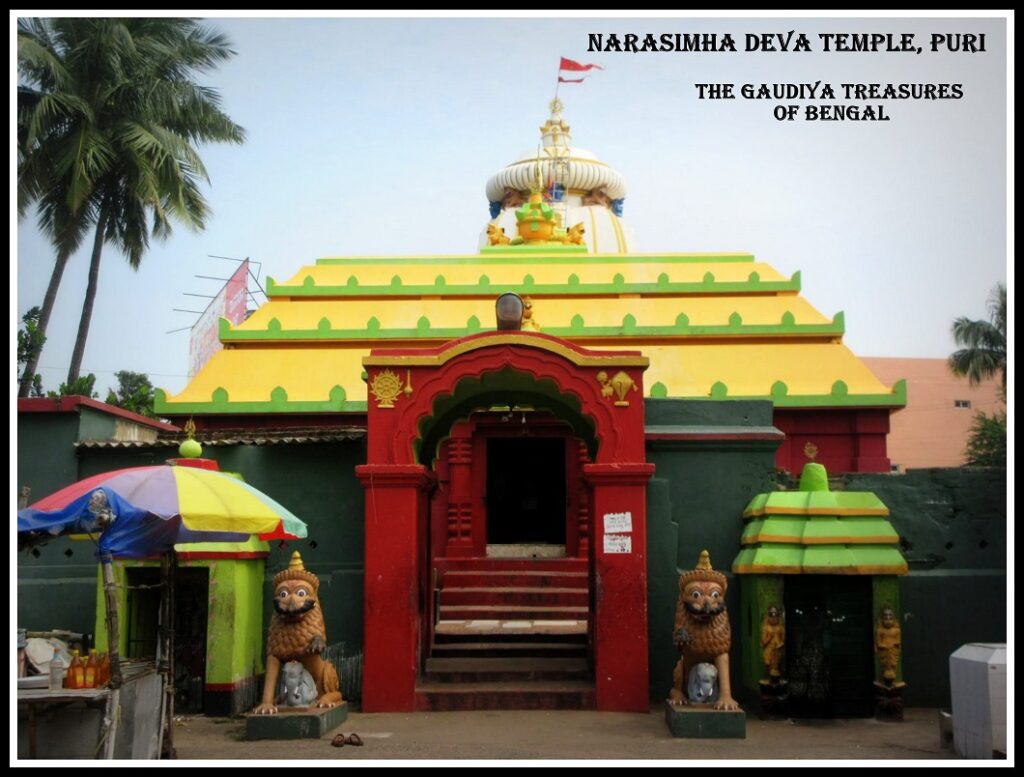
There are two deities of Lord Narasimha one behind the other, that are worshiped in this temple. A deity of ‘Shantha Narasimha’ (peaceful form) is worshiped at the front. This peaceful deity of Narasimha has human-like features- a sharp nose, curvy mustache, and an outstretched tongue. By seeing this form of Narasimha one feels calm causing all of one’s anger to subside. Once a Muslim marauder named Kalapahad ransacked Puri and damaged numerous Deities. But upon seeing this form of ‘Shantha Narasimha’, his anger subsided and he did not harm the Deity. The other Deity who is worshiped inside the temple is that of Ugra Narasimha deva. This is the fearful form of Lord Narasimha Deva.
Lord Narasimha is the fearsome half man-half lion form of the Supreme Lord Krishna, who had manifested Himself out of a pillar to protect His devotee Prahlada from the hands of demon Hiranyakashipu, his father. Hiranyakashipu was a mighty demon who had almost become immortal having been granted boons by Brahma. Hiranyakashipu wreaked havoc by conquering all of the three worlds in this material universe. No one could dare stand up against him in any war. The demigods were overthrown from their kingdoms in heaven and were made to bow at the demon’s feet. Hiranyakashipu was finally killed by Lord Narasimha deva who placed the demon on His lap and ripped open his body with His fingernails.
How to Reach :
Yajna Narasimha deva temple is situated at a distance of just 3 kilometers from the Jagannath temple in Puri. It is located at the end of Badadanda or Grand Road near the northeast boundary wall of the famous Gundicha Temple. The place is quite renowned and one can avail cabs to reach here directly.
#10 Narendra Sarovar
Narendra Sarovar is a large water body (873 feet long and 743 feet wide) located to the northeast of Jagannath temple in Puri, next to the Jagannath Vallabha garden. This pond is also known as ‘Chandan Pukur’ because the Chandan-yatra of Lord Jagannath takes place here. Narendra Sarovar is said to have been founded by King Bhanu Narasingha deva of Ganga dynasty. It was named after his mentor Nakhaposi Narendra Mahapatra.
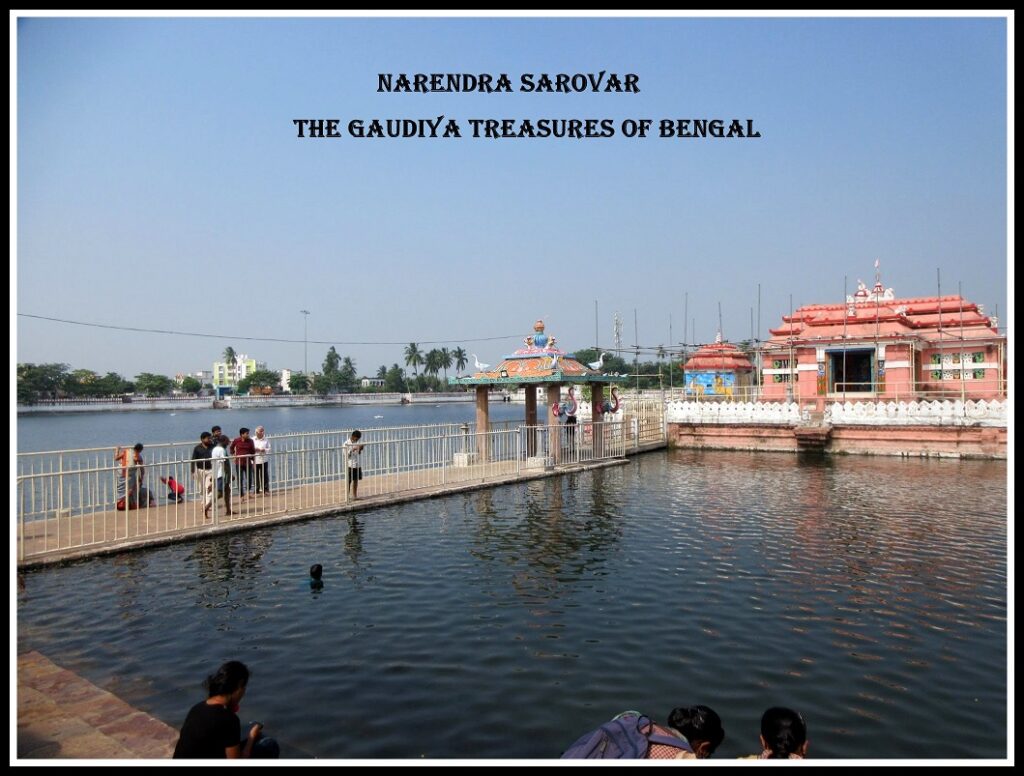
The representative deities of Lord Jagannath come here every evening for 21 consecutive days during His Chandan-yatra, starting from Akshaya-Tritiya (in the month of Vaisakha or April/May) up to Suklastami-tithi in May/June (Jaistha) to enjoy His boating pastimes (Nauka Leela). The boat ride on this serene lake helps relieve the intense summer heat and provide the Lordships with some comfort. It was here at Narendra Sarovar that Sri Chaitanya Mahaprabhu had enjoyed water pastimes along with His associates, 500 years ago, during Lord Jagannath’s Chandan Yatra festival.
Atharnala haite dashdanda haile
Mahaprabhu alien Narendra kule
Heno kale Ramkrishna Sriyatra Govinda
Jalakeli karibare aila Narendra
(Chaitanya Bhagavata, Antya, 8.101-102)
–
Going ten dandas from Atharnala Sri Chaitanya Mahaprabhu arrived at Narendra Sarovar. At that moment the deities of Krishna Balarama and Sri Govinda had come to enjoy their water pastimes at Narendra Sarovar.
How to Reach :
Narendra Sarovar is situated at a distance of about 1.5 kilometers from Jagannath Puri. This is located just beside Jatiya Baba samadhi Mandir in Jagannath Puri. Narendra Sarovar is quite renowned and one can avail cabs to reach here directly.
Featured Book on Jagannath Puri Dham Darsana
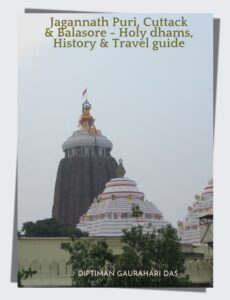
Jagannath Puri – Airport, Railway Station & Accommodations
Nearest Railway station – Jagannath Puri Railway Station
Nearest major airport – Biju Patnaik International Airport, Bhubaneswar.
At the time of writing this article, there is another airport presently being constructed at Jagannath Puri. However, this airport at Puri has not yet become operational.
Accommodation – One can choose to stay in any of the prominent hotels of Jagannath Puri.